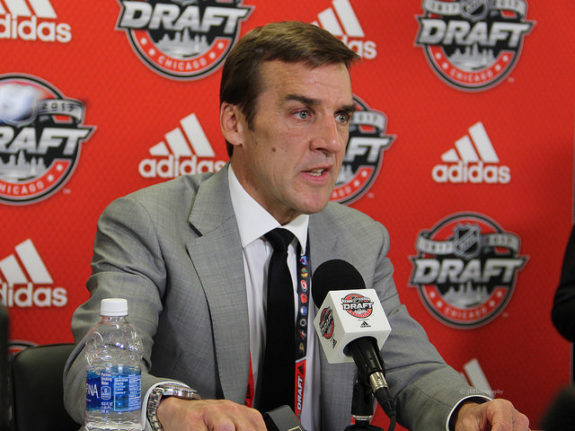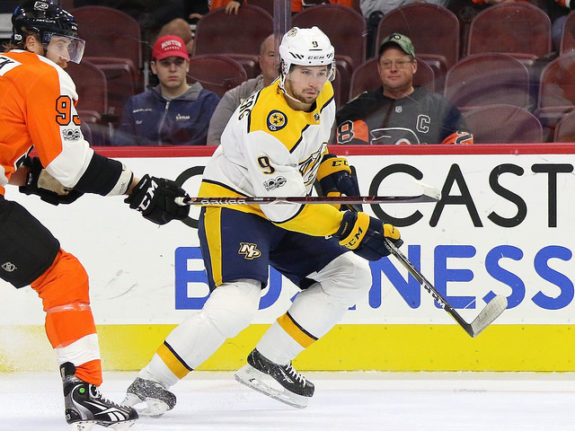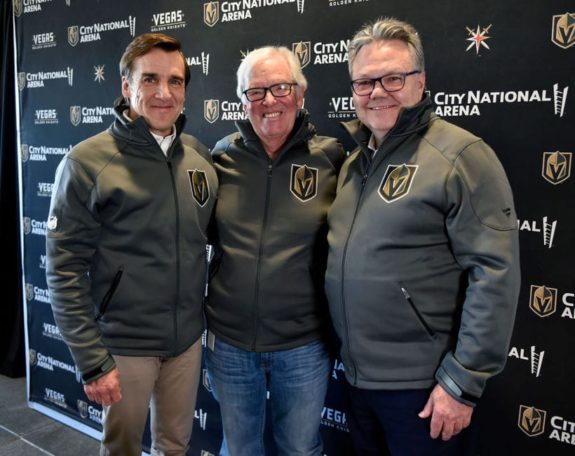Fewer people were cheering as much for the expansion Vegas Golden Knights in the 2018 Stanley Cup Final as then-general manager George McPhee. Fewer still had as much riding on their opponents and eventual champions, the Washington Capitals, McPhee’s last team.
Capitals vs. Golden Knights
Obviously, McPhee, now the Golden Knights president of hockey operations, would have preferred that things turned out differently. The Knights did lose in four straight after winning Game 1. As it happens, a clutch save by Capitals goalie Braden Holtby in the dying moments of Game 2 helped secure the Caps’ first win of the series, thereby turning the tide.
Who knows what would have happened had that single play gone
differently? Had the Golden Knights knotted it at three right then and there
and somehow managed to take a commanding 2-0 series lead? That’s in part the
point, though.
McPhee Takes Over for Poile
Holtby, a 2008 fourth-round draft pick, along with countless
others on the Capitals, was a product of McPhee’s tenure with the Caps. It was
a long one too, from 1997 until 2014. He took over for David Poile, who
coincidentally went on to head the then-expansion Nashville Predators.
McPhee’s tenure started off brilliantly, as the Capitals reached the Stanley Cup Final for the first time in franchise history his first season at the helm. Just like many would point to Poile, the all-time leader in wins by a GM, as one of the primary reasons behind the Capitals’ success that 1997-98 season, the same argument can be made to give McPhee credit for the eventual championship 20 years later.

Granted, McPhee was let go a full four seasons before his
successor and ex-assistant GM, Brian MacLellan, raised the Cup. And, to be
clear, there’s little taking away from how much MacLellan did to secure that
championship. It’s hard to deny the building blocks that McPhee had laid initially
eventually made for a solid foundation, though.
McPhee’s Stellar Draft Record
Even if you were to take away Alexander Ovechkin, who was a
can’t miss selection at No. 1 overall in 2004, consider the following draft
picks of McPhee’s (aside from Holtby):
- Nicklas Backstrom at No. 4 overall in 2006, who was far less of a “gimme” relative to Ovechkin; After Phil Kessel at No. 5, there was a sharp drop-off in talent available,
- John Carlson, who was arguably the front-runner for the Norris Memorial Trophy this season, at No. 27 in 2008,
- Dmitri Orlov at No.55 in 2009,
- Evgeny Kuznetsov, his transgressions notwithstanding, at No. 26 in 2010, which was a very top-heavy draft, adding to the impressiveness of Philipp Grubauer as a find at No. 112,
- Travis Boyd at No. 177 in 2011,
- Tom Wilson, Chandler Stephenson and Christian Djoos at Nos. 16, 77 and 195 in 2012 and
- Andre Burakovsky, who was just coming into his own this season, albeit as a member of the Colorado Avalanche, at No. 23 in 2013.
Including Ovechkin and Holtby, those are 12 names. For some
perspective, that’s effectively half the roster. It goes up to 14, if you
include Madison Bowey (No. 53 in 2013), who played 51 games that 2017-18 regular
season but didn’t dress in the playoffs, and Jay Beagle, who made his debut as
an undrafted free agent in 2008. In terms of impact, McPhee acquired half of
the team’s top 10 scorers during the playoffs (six during the regular season).
Filip Forsberg Trade Revisited
There’s no denying McPhee was far from perfect. Few of McPhee’s trades had much a lasting impact by the end, although he did acquire Jaromir Jagr for what amounted to spare parts back in 2001. On the flip side of the same coin, he was responsible for the infamously horrible Filip Forsberg trade to Poile’s Predators (for Martin Erat).

It was of course a bad trade, considering Forsberg’s current success with the Preds. However, at the time, it was easy to justify, as Forsberg was an uncertainty and Erat, who had two more full seasons on his deal when the trade was made, had just scored a career-high 58 points the previous campaign as a 30-year-old.
Ultimately, it didn’t work out, as the Capitals, who had
acquired Erat to gear up for a Cup run in 2012-13, bowed out in the first round
to the New York Rangers in seven games. Erat played in only four of them and
was held scoreless, notching just 27 points in 62 regular-season games for the
Caps, before getting traded to the Arizona Coyotes the following deadline in
one of McPhee’s final deals as their GM, as they failed to qualify for the
playoffs.
McPhee vs. MacLellan
Another way to look at the deal is how it reinforces the strength of McPhee’s overall draft record. In addition to all the names above, he selected the likes of Forsberg, Mike Green and Marcus Johansson. Granted, it took some time for him to find his legs in that regard, as between 1997 and 2001, he can really only claim Nick Boynton (No. 9 in 1997, redrafted by the Boston Bruins in 1999) and Johnny Oduya (No. 221 in 2001) as legitimate success stories, neither of whom so as much as played a single game for the Capitals.

Nevertheless, it’s clear McPhee’s fingerprints are all over the team that ended up winning the Cup. Obviously not to the degree they were all over the team that didn’t, with McPhee having engineered the Golden Knights from the ground up, stealing another find of his, the undrafted Nate Schmidt, in the expansion draft. Schmidt obviously wasn’t the only hidden gem McPhee uncovered, an effort for which he was ironically awarded the General Manager of the Year Award that same year, after his Golden Knights lost to “his” Capitals.
As meaningless as the award is, there was admittedly a kind of poetry to it all. MacLellan deserves credit for the championship, as it was his team. However, just like McPhee couldn’t have built the Caps without his right-hand man, MacLellan couldn’t have done the same without McPhee. A 2018 Stanley Cup win would have secured McPhee’s legacy as a great GM. As it happens, a loss did as well.